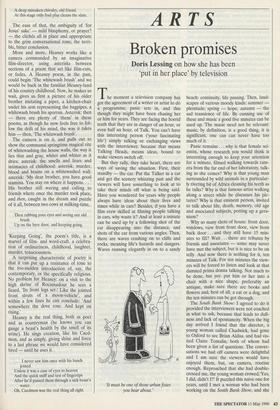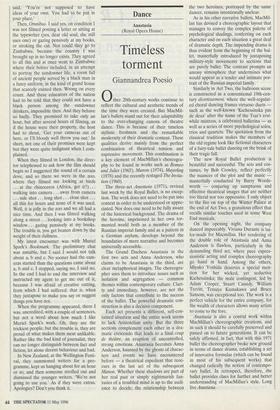ARTS
Broken promises
The moment a television company has got the agreement of a writer or artist to do a programme, panic sets in, and this though they might have been chasing her or him for years. They are facing the horrid truth that they are in danger of an hour, or even half an hour, of Talk. You can't have this interesting person (`your fascinating life') simply talking or exchanging views with the interviewer, because that means Talking Heads, means ideas, bound to make viewers switch off.
But they rally, they take heart, there are ways of saving the situation. First, their standby — the car. Put the Talker in a car and get the scenery whizzing past and the viewers will have something to look at to take their minds off what is being said. Have you wondered for years why people always have ideas about their lives and times while in cars? Besides, if you have a film crew skilled at filming people talking in cars, why waste it? And at least a minute can be used up by a following shot of the car disappearing into the distance, and shots of the car from various angles. Then, there are waves crashing on to cliffs and rocks, meaning life's hazards and dangers. Waves running elegantly in on to a sandy `It must be one of those urban foxes you hear about.' beach: continuity, life passing. Then, land- scapes of various moody kinds: summer plenitude; spring — hope; autumn -- the sad transience of life. By cunning use of these and music a good five minutes can be used up. The music need not be relevant: music, by definition, is a good thing, it is significant, one can can never have too much of it.
Panic remains .. . why is that female sci- entist, whose research you would think is interesting enough to keep your attention for a minute, filmed walking towards cam- era from the far end of her laboratory, talk- ing as she comes? Why is that young man surrounded by wild animals in a particular- ly riveting bit of Africa cleaning his teeth as he talks? Why is that famous artist walking along a street while he discusses his pic- tures? Why is that eminent person, invited to talk about life, death, memory, old age and associated subjects, potting up a gera- nium?
Why so many shots of house: front door, windows, view from front door, view from back door . . . and they still have 15 min- utes to fill? Wait .. . there are tributes by friends and associates — some may never have met the subject, but it is nice to be on telly. And now there is nothing for it, ten minutes of Talk. For ten minutes the view- ers will be forced to listen and look at that damned prima donna talking. Not much to be done, but yes: put him or her into a chair with a nice shape, preferably an antique, make sure there are books and flowers and, best of all, a cat or a dog, and the ten minutes can be got through.
The South Bank Show: I agreed to do it provided the interviewers were not coached in what to ask, because that leads to dull- ness and lack of spontaneity. When the big day arrived I found that the director, a young woman called Chadwick, had gone to Oxford to see Brian Aldiss, and had vis- ited Claire Tomalin, both of whom had been given a list of questions. The conver- sations we had off camera were delightful and I am sure the viewers would have enjoyed them, but, on camera, routine enough. Reproached that she had double- crossed me, the young woman crowed,`Yes, I did, didn't I?' It puzzled this naive one for years, until I met a woman who had been working on the South Bank Show, and she said, 'You're not supposed to have ideas of your own. You had to be put in your place.'
Then, Omnibus. I said yes, on condition I was not filmed posting a letter or sitting at the typewriter (yes, dear old soul, she still uses one) or gazing pensively at my books, or stroking the cat. Nor could they go to Zimbabwe, because the country I was brought up in no longer exists. They agreed to all this and at once went to Zimbabwe where their betises included, in an attempt to portray the sundowner life, a room full of ancient people served by a black man in a fancy uniform, in the kind of grand house that scarcely existed then. Wrong on every count. And these educators of the nation had to be told that they could not have a black person among the sundowner drinkers, impossible then. And they behave so badly. They promised to take only an hour, but after several hours of filming, as if the house were their property, the host had to shout, 'Get your cameras out of here, or I'll bloody well throw you out.' In short, not one of their promises were kept but they were quite indignant when I com- plained.
When they filmed in London, the direc- tor telephoned to ask how the film should begin so I suggested the sound of a certain dove, and so there we were in the zoo, where they filmed me looking at birds . .. at the rhinoceros (Africa, get it?) ... walking into camera ... away from camera ... side shot ... long shot ... close shot ... all this for hours and none of it was used. Well, it is jolly in the zoo and we all had a nice time. And then I was filmed walking along a street ... looking into a bookshop window ... gazing pensively at my books. The trouble is, you get beaten down by the weight of their dullness.
My latest encounter was with Muriel Spark's Bookmark. The preliminary chat was amiable, but I said I would not talk about a, b and c. No sooner had the cam- eras started than the questions came about a, b and c. I stopped, saying no, I said no. In the end I had to end the interview and instructed my agent to get me out of it, because I was afraid of creative cutting, from which I had suffered: that is, when they juxtapose to make you say or suggest things you have not.
When the programme appeared, there I was, uncredited, with a couple of sentences, but not a word about how much I like Muriel Spark's work. Oh, they are the trickiest people, but the trouble is, they are proud of what makes them most unlikable. Rather like the bad kind of journalist, they can no longer distinguish between fact and fiction, let alone decent behaviour and bad.
In New Zealand, at the Wellington Festi- val, they summoned writers for a pro- gramme, kept us hanging about for an hour or so, and then someone strolled out and dismissed the younger writers. 'We're not going to use you.' As if they were extras. Apologies? Don't you think it.



































































 Previous page
Previous page